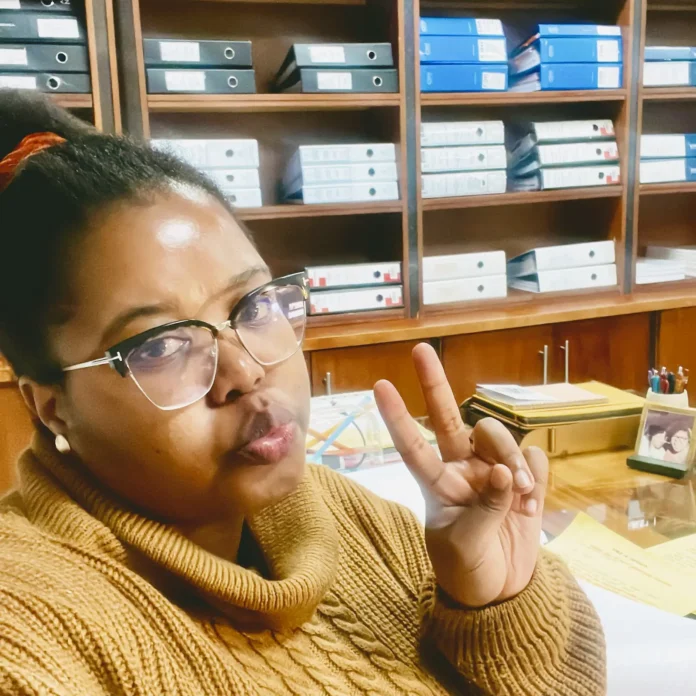In the echoing halls of the Free State High Court, where old legal lions like Laurance Hodes and Johan de Nysschen have long prowled, a new, electrifying presence has jolted the establishment.
Advocate Loyiso Makapela, representing Ace Magashule’s ex-aide Moroadi Cholota, has not merely entered the stage — she has rewritten the script.
With the legal world’s eyes fixed on the critical jurisdiction ruling due on June 3, Makapela has already delivered a courtroom performance that will be talked about long after the verdict’s ink has dried.
Now, this isn’t the stuffy drama of legal textbooks — this is legal warfare, and Makapela has come armed with sharp precedent and sharper instincts.
Her target? The messy extradition that landed Cholota in the dock.
Extradition forte of the minister
She seized upon the recent Supreme Court of Appeal decision in Minister of Justice v Schultz (2024), which stressed that the authority to request extradition belongs to the justice minister, not the National Prosecuting Authority (NPA).
Yet, in a move brazen even by South African prosecutorial standards, it was the NPA that reached across the Atlantic to the US for Cholota’s extradition.
In a “trial within a trial” that had seasoned lawyers leaning forward, Makapela forced the state to admit its Hawks officers — Captain Benjamin Calitz and Brigadier Nico Gerber — had nothing to do with the extradition.
She was not just poking holes; she was turning prosecutorial confidence into a colander, demanding the NPA itself step into the witness box to explain.
De Nysschen dismissed this as mere straw-clutching. But Makapela’s legal scalpel cut deeper.
When the NPA included four fraud charges the US authorities had specifically refused to extradite on, she pounced.
Prosecutors, caught flat-footed, tried to withdraw the charges after Cholota’s not guilty plea, blaming a bureaucratic “oversight”.
Was it psychological pressure
Makapela did not stop there. She laid bare Cholota’s ordeal — how, in a US hotel in 2021, the SA Police Service and the Federal Bureau of Investigation agents allegedly subjected her to hours of psychological pressure, urging her to implicate Magashule under a threat of prosecution.
The record shows that before that moment, neither the Zondo commission nor the Special Investigating Unit nor the public protector had pointed a finger at Cholota.
The late-breaking fraud charges — conspicuously added after the US had said “no” — became ammunition for Makapela’s argument that this was prosecution by intimidation, not by facts.
When she grilled Hawks investigators, their admissions — no tape of the US interview, no evidence Cholota was read her rights — spoke volumes.
All eyes now turn to June 3, when the court will decide whether it even has jurisdiction to try Cholota.
If Makapela prevails, the state’s case could evaporate overnight, Cholota would walk free, and the entire Magashule asbestos saga might collapse at its legal foundations.
More than that, it would force the justice system to recognise Schultz as binding law, stripping the NPA of a cherished tool and demanding a rethink of how extraditions are run.
And, with the state’s missteps in full view, Makapela’s narrative of institutional bullying would be vindicated.
Defence ready
Yet, even should the court rule against her, Makapela has manoeuvred the case perfectly for a higher court appeal.
The defence has already signalled its readiness to take the fight to the Supreme Court of Appeal and even the Constitutional Court — whatever it takes to expose what Makapela frames as prosecutorial overreach.
What makes all this so compelling is the David-and-Goliath nature of the duel. De Nysschen, wielding all the might of the state, faced a challenger who refuses to blink.
When De Nysschen tried to slap Cholota with special bail restrictions on the basis of her extradition, Makapela called out the unequal treatment and got them scrapped.
She didn’t stop at the courtroom door, either — she fought against the freezing of Cholota’s assets, painting the state’s actions as punitive excess against a young scholar caught in the crossfire of political power games.
In a trial littered with state admissions of “oversight” and disregard for legal process, Makapela has become more than an advocate.
She is, to borrow a phrase, the conscience of the courtroom — an advocate who insists that the law is not a cudgel for the powerful but a shield for the vulnerable.
The legacy she is forging is not just her own but one for every South African who expects the state to follow its own rules.
Whatever Judge Loubser decides on June 3, Makapela has already ensured her place in the country’s legal lore.
Through ruthless logic, mastery of the law, and an unyielding spotlight on state conduct, she has turned the asbestos trial into a crucible — and out of it, a star has been born, one whose light is set to burn in South African courtrooms for years to come.
Visit SW YouTube Channel for our video content



